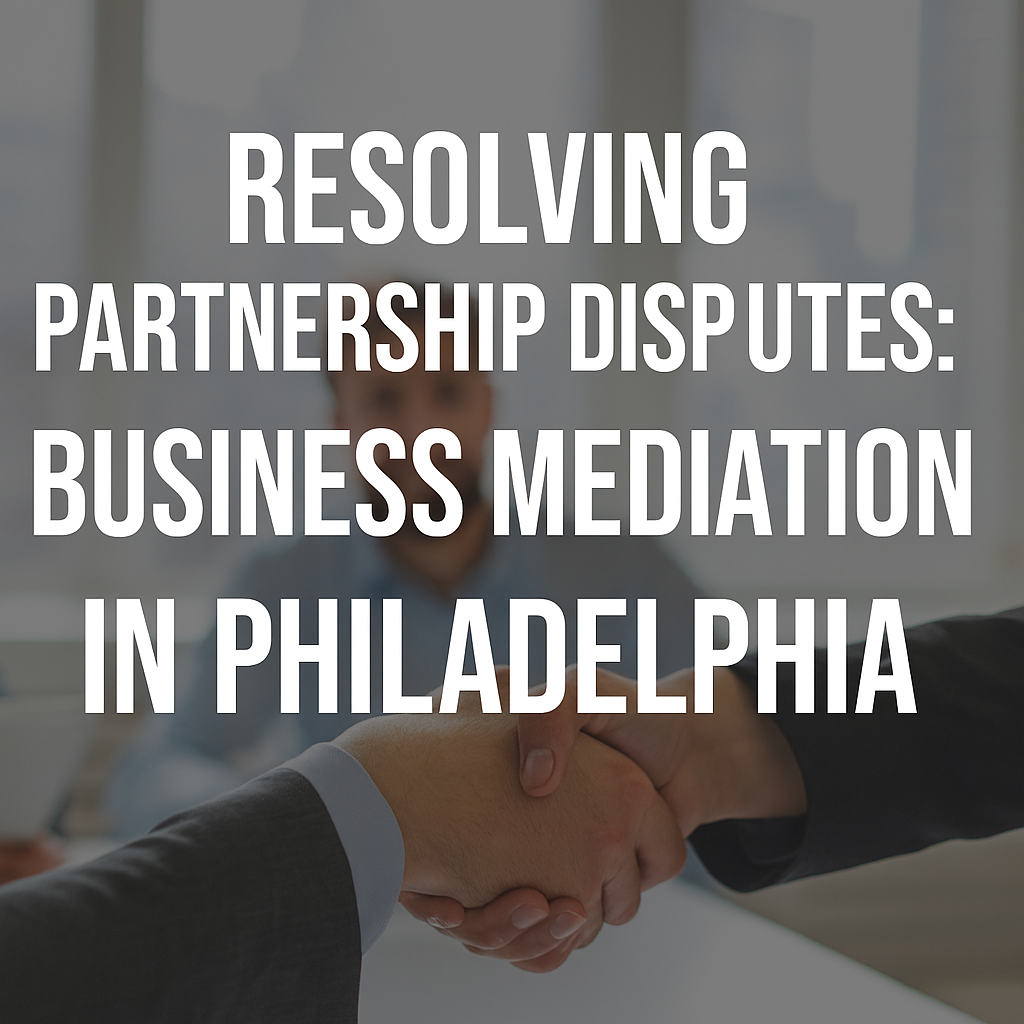Resolving Partnership Disputes: Business Mediation in Philadelphia

Introduction: Why Partnership Disputes Matter
Partnerships are the backbone of many thriving businesses in Philadelphia, South Jersey, and the surrounding region. When they work well, they allow companies to grow faster, expand into new markets, and leverage complementary skills. But when disagreements arise between partners, they can threaten the entire enterprise.
Studies have shown that nearly 70% of business partnerships eventually fail, not because the business idea was flawed, but because conflicts between partners become unmanageable. Left unresolved, disputes can stall decision-making, damage reputations, and even lead to costly litigation or dissolution.
Fortunately, there is a better path. Business mediation offers a confidential, cost-effective, and constructive way for partners to resolve disputes while keeping the focus on growth and long-term success.
Common Causes of Partnership Disputes
Partnership conflicts surface in any business, regardless of size or industry. Some of the most common causes include:
- Misaligned Expectations: One partner feels they are carrying more of the workload or contributing more capital.
- Strategic Disagreements: Clashes over how to run the business—whether it’s day-to-day operations, expansion plans, or succession planning.
- Financial Conflicts: Disputes over profit distribution, reinvestment priorities, or accounting transparency.
- Personal Friction: Differences in leadership styles or communication breakdowns that escalate into bigger conflicts.
Example: Consider a Philadelphia-based small business where one partner wants to expand aggressively while the other insists on maintaining conservative operations. Without intervention, this type of deadlock can paralyze growth by the partners sticking to their positions. With mediation, the mediator focuses partners on their business and personal interests, getting them out of their stuck positions.
Why Confidentiality Is Crucial in Business Mediation
One of the strongest advantages of mediation is confidentiality. Unlike litigation, which is a matter of public record, mediation is private. Why is this helpful? With mediation, partners maintain their reputation, keeping the dispute behind closed doors, protecting the business’s hard-earned brand. Moreover, confidence from employees, clients, and investors remains steady, preventing publicity of internal conflicts, damaging morale and disrupting trust in leadership.
Additionally, confidential mediation will protect the private nature of sensitive business information, such as financial records, trade secrets, and operational details.
Many business owners in Philadelphia and South Jersey choose mediation precisely because it keeps sensitive issues internal, allowing disputes to be resolved without exposing vulnerabilities to competitors, clients, or the public.
Shared Goals: Keeping the Business on Track
Even when partners are in conflict, most share a common end goal: they want the business to succeed. Think of mediation as a type of therapy, permitting the partners to:
- Focus on Growth: Mediation reminds partners that their ultimate objectives often align.
- Clarifying Positions: By moving beyond emotional arguments, mediation helps highlight shared interests.
- Example: Two South Jersey partners disagreed over management style: one favoring tight oversight, the other prioritizing employee autonomy. Through mediation, they realized both approaches aimed at the same outcome: efficiency and employee satisfaction.
By reframing the conversation, mediation transforms disputes into opportunities to strengthen the business.
The Role of a Neutral Mediator
A skilled mediator brings objectivity, perspective, and structure to an otherwise tense situation. Mediators reframe positions into interests and help each partner see the broader picture in effort to find common ground with those they presently disagree with. They prevent discussions from devolving into unproductive arguments by using facilitative strategies in clarifying the aforementioned interests. By serving as a steady guide, business mediators like Ari Sliffman in Philadelphia and South Jersey empower partners to make informed decisions that protect both relationships and profitability.
How the Mediation Process Works for Partnership Disputes
A business mediation process is straightforward, efficient, and designed for constructive problem-solving. First and foremost, the partners must buy into the mediation process. Without buy-in, a mediation will likely not be fruitful. Once agreement to mediate occurs (assuming a mediation clause is not already in your partnership agreement), then the following steps are generally followed:
- Step 1: Initial Consultation – Mediator identifies the main issues and establishing ground rules with each involved business partner through pre-mediation calls, potentially memoranda or statements to outline the issues, and the mediator will provide the parties with certain preparation recommendations for the session.
- Step 2: Information Exchange – Confidential sharing of financial, operational, and strategic documents pertaining directly to the conflicts at issue.
- Step 3: Facilitated Discussions – This is the typical “mediation session.” The mediator guides structured conversations to surface shared interests and explore solutions.
- Step 4: Agreement Drafting – A written settlement is prepared, tailored to the business’s unique needs.
This process not only resolves disputes but also provides tools for partners to handle future disagreements more effectively.
When to Consider Mediation for Your Partnership
Not every disagreement requires mediation, but certain warning signs indicate it’s time to bring in a neutral professional:
- Conversations between partners become unproductive.
- Disagreements delay business decisions.
- Rising tension impacts employees, clients, and/or investors.
Taking a proactive approach by engaging a mediator early can prevent disputes from escalating into costly litigation or, worse, the dissolution of the partnership. Moreover, you should strongly consider including a mediation clause within your partnership agreement, leaving one less thing to disagree on when conflict arises.
Conclusion: Protecting Your Business and its Future
Partnership disputes don’t have to signal the end of a business. With the help of confidential business mediation in Philadelphia and South Jersey, partners can resolve conflicts privately, efficiently, and constructively. Mediation not only protects the business’s reputation but also allows partners to move forward with renewed focus on growth.
If you’re a business owner or corporate lawyer in Philadelphia, South Jersey, or the surrounding areas, consider how mediation can protect your business, your relationships, and your future.
At AJS Resolutions, Ari Sliffman helps businesses navigate disputes with discretion, professionalism, and a clear focus on long-term success. Whether you’re facing a current conflict or want to establish proactive strategies for the future, mediation offers a proven path forward.
Contact us today to see how Ari Sliffman can assist with your business partnership conflict, or simply book your mediation session today.
